


•
•
•
•
•
•











•
•
•
•
•
•










With global markets in turmoil and inflation on the rise, investors are worried about the health of their portfolios. As a specialist healthcare investment trust, we focus on powerful growth stories, from disruptive biotech to global pharmaceuticals. With a diversified and conservative approach, the Polar Capital Global Healthcare Trust accesses multi-decade themes while expertly navigating near-term volatility with its bias to large defensive companies. Forward looking. Actively managed. Highly specialised.
polarcapitalglobalhealthcaretrust.co.uk
Capital at risk and investors may not get back the original amount invested. This advertisement should not be construed as advice for investment. Important information: This announcement constitutes a financial promotion pursuant to section 21 of the Financial Services and Markets Act 2000 and has been prepared and issued by Polar Capital LLP. Polar Capital is a limited liability partnership with registered number OC314700, authorised and regulated by the UK Financial Conduct Authority (“FCA”) .
 London Stock Exchange Ticker: PCGH
London Stock Exchange Ticker: PCGH
It feels like we are once again on the cusp of change in the markets. Whether that’s a shift in central bank policy, inflation easing or a major development with the Ukraine war, there are plenty of levers which could put stocks on the move – either up or down. The difficulty is knowing which way they will travel.
At this time of year, fund managers are under pressure to set out their stall for the coming 12 months. They need to reassure investors that their portfolio is optimally positioned to cope with whatever is thrown at the market.
Many will stick their knitting and simply say existing holdings should withstand whatever happens. However, one manager sticks out for dividing their portfolio in three themes. They’re hedging their bets as to what might happen and effectively saying to investors their portfolio will be able to participate in whatever direction markets take.
If one theme takes off, what happens to the other two themes which aren’t in play? Will the manager cut them off quickly or keep them in case there’s another shift in the market soon after? That’s a difficult decision for the person in question, Thomas Moore from Abrdn Equity Income Trust (AEI).

His first bucket contains companies that he believes should be resilient or do well if inflation remains high for a while. Here, Moore has invested in the likes of Shell (SHEL) and NatWest (NWG), with the objective of achieving real growth in income.
The second part of the portfolio features stocks offering generous dividends, with high
yields typically a sign that the market has priced in potential bad news. Relevant names in the portfolio include Legal & General (LGEN) and the aim is to achieve above-average income.
Finally, Moore has a pool of stocks that are deemed out of favour in the current environment but which, he believes, could deliver good operational progress in time. Sofa seller DFS (DFS) is one example of this theme.
Moore highlights research from Stifel which found that stock markets bottom out four months before the end of a recession. He says many people believe we’re already in recession and that it could be short-lived, potentially ending in March. On that basis, we’ve already seen the market bottom. If correct, it would suggest investors might favour the previously unloved stocks part of the portfolio and show less interest in some of the inflation winners found elsewhere.
The manager is faced with a difficult decision –go all-in on one area or hedge his bets by having his fingers in three pies. This situation is a good example of how investors need to think about their own strategy – do they spread their risks or have conviction in just one area?
Fund managers with concentrated portfolios will probably say the best returns come from having utmost conviction but they’ll suffer hard if they get it wrong.
Moore’s strategy might see him achieve smaller returns versus only being in the winning strategy, but his three-prong approach also means he is taking fewer risks. In the long term that is the better path for most retail investors to emulate.
Rising number of senior management departures may be a warning sign
It seems as though barely a week goes by without a chief executive or chief financial officer either jumping ship to another firm or leaving the business completely to pursue ‘other interests’.
At the start of this week, FTSE 100 mobile network operator Vodafone (VOD) announced chief executive Nick Read would step down at the end of December but would remain in an advisory role for the next three months.
Given the board has no immediate successor lined up, chief financial officer Margherita Della Valle has been appointed interim chief executive while a search is conducted, creating some uncertainty over whether he jumped or was pushed.
Vodafone shares are down around 20% this year, compared to a small gain for the FTSE 100, with some commentators suggesting Read’s failure to convince investors of his ability to improve the group’s results and raise its share price –particularly after having cut the full year outlook less than a month ago – was the reason for him stepping down.
fortunes or its share price short of a ‘fire sale’ of some of its assets.
Read’s departure takes the number of outgoing FTSE 100 chiefs to 19 this year, while the total number of chief executives and chief financial officers who have resigned across UK plc is much higher.
Some have switched firms, but many more have quit their respective industries altogether as the storm clouds of recession gather.
The resignation of so many skilled executives, who having steered their firms through the pandemic were looking forward to clearer skies ahead, only to be faced with the prospect of a steep downturn instead, can’t be good news for the economy.
Vodafone isn’t the only company in limbo, either: consumer goods giants Reckitt (RKT) and Unilever (ULVR) also have interim chief executives while the search continues for new talent.

In the case of Unilever, investor Nick Train, who manages both Lindsell Train Investment Trust (LTI) and Finsbury Growth & Income (FGT), believes outgoing chief executive Alan Jope was talented but ultimately unlucky in that after a 30-year career at the firm his leadership coincided with the pandemic.
However, as analysts at Berenberg point out, the firm faces stiff headwinds and relentless competition, and it is unclear what a new chief executive could do to revitalise Vodafone’s
Train told Shares he doesn’t expect a new chief executive to make radical changes as the company has served its customers and its shareholders very well over the last two decades. [IC]
Disclaimer: The author owns shares in Finsbury Growth & Income.
The past month has seen a significant fall in oil prices. Having flirted with the $100 per barrel mark for the first time since the summer in early November, Brent crude is now closer to $80 as traders fret about the impact on demand of a slowdown in the global economy.
Renewed hopes of a loosening of Chinese Covid restrictions gave the crude market a bit of relief at the start of December but it has proved short-lived.
Little wonder that talk is returning of OPEC deepening production cuts, even if a meeting on 4 December saw the producers’ cartel stick with the planned 2% cut for the time being.
The introduction of a cap on Russian oil prices of $60 per barrel by G7 nations and a European Union ban on Russian seaborne oil imports further complicates the picture. However, the $60 cap is above the price at which Russia’s oil is currently selling – attracting criticism from Ukrainian leader Volodymyr Zelensky. And some EU countries have been granted exemptions on the import ban.
Given this situation and the outlook for growth, the actions of OPEC will probably have more bearing on the future direction of oil prices.
The weak oil price backdrop has contributed to a difficult second coming for Ithaca Energy (ITH) after it re-joined the stock market on 9 November. Talk it might earn a place in the FTSE 100 has proved premature as the shares have dropped 28% on their 250p listing price.
Ithaca’s shares previously traded in London before being taken over by Israeli conglomerate Delek Group (DLEKG:TLV) for £510 million in 2017. Since then, Ithaca has become one of the largest producers in the North Sea thanks to a
series of acquisitions.
Proceeds of £262.5 million from the recent stock market listing will be used to pay debts owed to Delek which remains the controlling shareholder with an 89.4% stake. In its first update, covering the nine months to 30 September, Ithaca posted adjusted post-tax profit of $391 million and committed to its ‘firm expectation’ of paying $400 million in dividends in 2022.
A firm set to bid farewell to the UK stock market is Tanzanian gas producer Wentworth Resources (WEN:AIM) which has agreed to be taken over by French firm Maurel & Prom (MAU:EPA) in a £61.7 million deal – a 30% premium.
Despite consistently delivering on operations and rewarding investors with generous dividends, Wentworth has struggled to earn much credit with the market, and this makes acquiescing to the deal an understandable move. [TS]
After a bruising market reaction to his miniBudget in September, then-chancellor Kwasi Kwarteng told banks and financial services bosses he wanted to introduce a ‘Big Bang 2.0’ package of reforms to make the City a more attractive place to invest.
Readers with a long memory will recall the original Big Bang back in October 1986, which deregulated the financial markets and ushered in a wave of takeovers of old-style partnership firms by large foreign buyers as well as moving share trading onto an automated platform.
‘Big Bang 2.0’ includes ambitious plans such as a reversal of the rules forcing banks to separate their retail arms from their riskier investment banking businesses.
These rules, brought in after the Great Financial
Cinema




Cineworld (CINE) which filed for Chapter 11 bankruptcy in September 2022 denied it was looking to auction off certain Eastern European assets.
Bloomberg reported (2 December) Cineworld had held talks to sell its Cinema City and Yes Planet chains in Eastern Europe and Rav-Chen
Crisis, at the same time as the US Dodd-Frank Act, were designed to make the financial system safer for investors and taxpayers by preventing banks from over-leveraging themselves.
The Financial Services & Markets Bill, designed to replace EU banking rules, is currently before Parliament and proposes changing the ring-fencing rules in order to free up so-called ‘trapped capital’ held by the banks.
However, Financial Times columnist Martin Wolf argues promoting competitiveness by relaxing regulations ‘will start the journey down a dangerously slippery slope’, risking another financial crisis, because the UK banks are still insufficiently capitalised.
‘Banks built on upside-only bets for their decision makers are sure to crash,’ warns Wolf. [IC]
that it would seek to implement a de-leveraging transaction that will ‘significantly’ reduce the group’s debt and strengthen its balance sheet. It expected to do this with the support of its lenders.
operations in Israel with bids pitched around $1 billion.
A spokesperson for Cineworld said: ‘Cineworld has not initiated, and does not intend to initiate, an individual auction for any of its US, UK or [rest of world] businesses on an individual basis.’
At its half year results (30 September) Cineworld reported
Speculation around Cineworld was further stoked by Tim Richards, the founder of the UK’s third largest cinema chain Vue who told The Times it was ready to take advantage of any consolidation opportunities which presented themselves.
Vue’s appetite for deals follows a restructuring which saw lenders swap £465 million of debt into equity and provide £75 million of liquidity. [MG]
Not everyone thinks the changes are for the better and they see risks ahead
Management believes this ‘exceptional’ trading performance can continue beyond 2022. ‘EBITDA profitability is expected to continue its strong trajectory,’ insisted the company.
CONSISTENT GROWTH AND recent upgrades to earnings forecasts from Yu Group (YU.AIM) have sent the shares up 87% over the past six months and the independent gas and electricity supplier’s latest trading update (28 November) helped sustain the rally.
Energy crisis beneficiary Yu said sales, adjusted earnings before interest, tax, depreciation and amortisation (EBITDA) and operational cash flow for the year to December 2022 are expected to ‘significantly exceed’ market
expectations.
Yu Group helps business customers to manage rising energy costs and it recently launched Yu Smart to support growth through opportunities in smart metering and electric vehicle charge installation.
The company said it had enjoyed record average monthly bookings from new and renewed customer contracts over the last three months, leaving it on course for a 67% rise in sales to £260 million for 2022.
Yu Group continues to make progress towards its medium-term goal of £500 million of revenues with an adjusted EBITDA margin north of 4%. [JC]
Yu Group (p)
The owner of the Ticketmaster platform faces significant headwinds
Ticketmaster-owner Live Nation Entertainment (LYV:NYSE) has suffered a terrible time on the stock market this year with its share price down 39%. A multitude of problems have weighed on the company’s valuation and sentiment remains poor going into 2023.
You might have expected 2022 to be a good year for the live music promoter and ticket seller given that
lots of famous musicians played concerts to capitalise on pent-up demand for events post-Covid.
At the end of the third quarter, Live Nation said more than 115 million tickets had been sold year-to-date through its system, up 37% on 2019. Yet investors are worried about the impact of a recession on 2023’s takings and a potential regulatory crackdown on ticketing fees.
There was also a big backlash regarding the chaotic selling of Taylor Swift tickets. Hundreds of thousands of fans couldn’t use the Ticketmaster platform to buy presale tickets and the general ticket sale was then cancelled. The New York Times reported that the Justice Department was looking at whether Live Nation had abused its power within the industry. [DC]
Business energy supplier expects its ‘exceptional’ trading to continue beyond 2022
Securities Trust of Scotland looks like a sensible investment for uncertain times
(STS) 228.6p
Market cap: £231 million
Looking into 2023 after a tricky year for the markets and investors are still presented with a significant amount of uncertainty around interest rates, inflation, recession, war and more.
For those who want exposure to stocks but with a measure of protection, investment trust Securities Trust of Scotland (STS) looks a sensible option.

The investment manager Troy Asset Management, has a cautious philosophy and aims to achieve rising income and long-term capital growth through investment in a portfolio of global equities.
A balanced approach and diversified exposure to the team’s best ideas should leave the portfolio well
Securities Trust of Scotland - asset
Securities Trust of Scotland - asset
Consumer staples 41% Information technology 20%
Consumer staples 41% Information technology 20%
Healthcare 14% Financials & real estate 10% Consumer discretionary 6% Industrials 5% Communication services 3% Cash 1%
Consumer staples 41% Information technology 20% Healthcare 14% Financials & real estate 10% Consumer discretionary 6% Industrials 5% Communication services 3% Cash 1%
Healthcare 14% Financials & real estate 10% Consumer discretionary 6% Industrials 5% Communication services 3% Cash 1%
Table: Shares magazine • Source: Securities Trust of Scotland, Factset, 31 October 2022
Table: Shares magazine • Source: Securities Trust of Scotland, Factset, 31 October 2022
Table: Shares magazine • Source: Securities Trust of Scotland, Factset, 31 October 2022
placed to withstand whatever confronts it over the next 12 months. The shares trade roughly in line with net asset value.
Over the past 12 months Securities Trust of Scotland has achieved an 8.6% positive total return versus -3.8% for the MSCI All-Countries World index in sterling, according to FE Fundinfo. To put that in context of some of the most popular global funds among retail investors, over the same period Fundsmith Equity (B41YBW7) and Blue Whale Growth Fund (BD6PG78) both saw negative returns at -8.5% and -22.5% respectively.
Since Troy took over managing Securities Trust of Scotland in November 2020 it has generated a total return of 21.6%.
Steered by James Harries and Tomasz Boniek, it has a concentrated portfolio with a total of 33 holdings and the top 10 accounting for nearly 50% of the portfolio. A lot of the names will be familiar to investors including US soft drinks and snacks giant PepsiCo (PEP:NASDAQ), as well as consumer goods names Johnson & Johnson (JNJ), Unilever (ULVR) and alcoholic drinks outfit Diageo (DGE). The trust also has holdings in Philip Morris (PMI:NYSE) and British American Tobacco (BATS).
In their latest commentary Harries and Boniek explain why they recently added chip maker Texas Instruments (TXN:NASDAQ) to the portfolio: ‘While other semiconductor companies have to constantly design and manufacture new CPUs to satisfy the insatiable need for greater computing power, TI chips work for decades. We believe that roughly half of TI’s sales derive from chips designed more than 10 years ago. The result is a business with little technological risk and relatively low capital intensity.’
This reasoning tells you everything you need to know about the trust’s strategy – the managers like solid, reliable businesses which don’t need large amount of money to grow and therefore have cash left over to reward shareholders.
Because they avoid cyclical stocks and look for businesses which are conservatively financed, the portfolio should be insulated from the impact of higher rates and any downturn in the economy. The emphasis is also on firms with competitive advantages which can generate high returns on capital in the long term.
These advantages can be derived from investing in companies that own strong brands which produce habitual repeat purchases, have persistent demand and high switching costs like Japanese
British American Tobacco 6.6%
Paychex 5.6%
PepsiCo 5.5%
Unilever 4.8%
ADP 4.7%
Philip Morris International 4.5%
Reckitt Benckiser 4.1%
Johnson & Johnson 4.0%
CME 4.0%
3.9%
gaming firm Nintendo (7974:TYO), or exposed to non-discretionary spend such as healthcare.
The managers also put a real premium on meeting face-to-face with the companies they invest in: ‘We think like business owners. If we were to buy the proverbial newsagent around the corner, we would of course visit the shop and talk to the owners.
‘When we invest in a publicly listed company, we are buying the business, not trading the shares. Therefore, as business owners, one of our main responsibilities is to visit the companies we own. No amount of desk research produces the same insights one could gather from observing companies at their premises.’
Securities Trust of Scotland pays a quarterly dividend with a yield of 2.6%. There is an emphasis on stocks who are growing their income rather than ones which trade on higher yields but are at greater risk of cutting their dividends.
Research group Kepler comments: ‘The focus on strong balance sheets, good management and sustainable earnings looks like an attractive strategy in a troubled economic climate. We note that historically the managers’ portfolios have tended to perform well in market drawdowns, which is likely to be reassuring given the risks that currently abound.’
The OCF (ongoing charges figure) of 0.93% is a touch higher than the average for the AIC Global Equity Income sector. This perhaps reflects the relatively small size of the trust but as Kepler observes: ‘Troy has demonstrated a track record of successfully growing other trusts such as Personal Assets (PNL) and Troy Income & Growth (TIGT), so investors may very well enjoy a fall in the OCF in due course.’ [TS]
Daniel Coatsworth who edited this article owns units in Fundsmith Equity Fund
“
Kepler
The world’s largest sportswear company is an innovation champion whose shares appear cheap relative to history

A30% share price drop at Nike (NKE:NYSE) from 2021’s all-time peak of $177.5 presents a buying opportunity for longterm investors prepared to look past present challenges and pay up for a quality innovator with years of growth ahead of it.
Near-term challenges for the world’s largest sportswear company include elevated freight and logistics costs and an inflation-induced consumer spending squeeze.
Nevertheless, Shares believes the sneakers-tosoccer balls behemoth will remain the world’s preferred sportswear brand for years to come given its strong brand, scale and digital savvy.
Catalysts for the share price over the months ahead include evidence Nike is successfully reducing excess inventories without too much recourse to margin-eroding discounts and a return to growth in China helped by a release from lockdown restrictions in this vast market for consumption.
The American sportswear giant famed for its iconic swoosh logo needs no introduction and for this very reason, investors are familiar with its qualities and the shares aren’t cheap in absolute terms. According to Stockopedia, Nike trades on 37.7 times forecast earnings for the year to May 2023 falling to 29.8 times based on 2024 estimates.
Yet this rating actually represents a massive discount to 2020’s peak price to earnings ratio of 80 times. And the recent de-rating has created a buying opportunity in the Oregon-based athletic
apparel leader, whose sustained investments in product innovation, supply chain speed and digital have created competitive advantages and a wide economic moat that should unlock a multi-year period of above-average growth.
Nike is also a copiously cash-generative company that makes higher returns on the money it spends than rivals including Adidas (ADS:ETR) and has increased the dividend for 20 consecutive years.
While inflation has stirred up headwinds, Nike’s formidable brand strength confers the ability to raise prices on its aspirational footwear – the company frequently releases new styles of ‘musthave’ running shoes and trainers and is the brand of choice of many elite athletes – which it enables it to protect its margins.
The NIKE Direct business, which gives Nike greater control over the brand and margins and forms a key plank of the long-run strategy, is in growth with sales dashing 14% higher at constant currency to $5.1 billion in the first quarter ended 31 August 2022. And while there is competition in China from homegrown competitors including Anta and Li Ning, neither brand has the international cache of Nike, which offers investors a great way to play trends towards health and fitness, the casualisation of fashion and the growth in athleisure. [JC]
Gain to date: 5.5%
We said to invest in Aberforth Smaller Companies Trust (ASL) on 22 July 2022 because of its value-focused credentials and the fact you could effectively buy its portfolio for 12.5% less than the market value of its holdings.
With a lot of the macroeconomic bad news already priced into markets we could see the potential upside for a skilled stock picker focused on small caps.
WHAT’S HAPPENED SINCE WE SAID TO BUY?
Value stocks have continued to benefit from the tailwind of rising interest rates and investors are slowly regaining interest in a select number of smaller companies. The shares have risen 13.8% over the last three months.
Meanwhile, the trust’s discount to NAV has narrowed to 10.9%. Although it is not deemed an income fund, it has a 2.7% trailing yield and potential to achieve real growth in dividend income.
Research group Kepler believes the board will be able to increase the pay-out again this year, adding to ‘already substantial’ reserves. Investment trusts can dip into revenue reserves during hard times to maintain dividend payments.

In addition, the board has been actively buying back shares at a discount to NAV. So far in the current financial year the company has bought £32 million worth of shares at an average discount of 14% according to Kepler.
With inflation proving sticky, interest rates seem unlikely to fall anytime time soon, providing a continued tailwind for value managers.
Analysis completed by Aberforth’s managers show current share prices in the portfolio already discount a UK recession. While there is always room for sentiment to fall further the chances of absolute and relative outperformance remain favourable. Continued narrowing of the trust’s discount to NAV provides further support for the shares, which continue to look attractive. [MG]
Japan held up relatively well but don’t mention the disastrous showing for AIM stocks
Abit like Spotify Wrapped, where the streaming platform’s final list of your most-heard songs in a year never matches your expectations, the end-of-year performance ranking of major stock indices around the world also contains a few surprises.
Brazil’s Bovespa index is not the outright winner for 2022 as many might have expected. It’s been pipped at the post by India’s S&P BSE 100 index, a country where the impact of inflation on economic activity is less severe than in many other parts of the globe. Between 1 January and 1 December 2022, the Indian index advanced 8.3% in value.
The world economy is set to have weakened from 6% GDP growth in 2021 to 3.2% in 2022 and then slow further to 2.7% in 2023, according to the International Monetary Fund. Against this backdrop, India is expected to have fared relatively well with 6.8% GDP growth in 2022 (versus 8.7% in 2021) and advance 6.1% next year. That’s certainly better than China whose GDP growth is expected to nearly halve between 2021 (8.1%) and 2023 (4.4%).

As a nation rich in commodities production, it’s certainly been a good year for Brazil as the prices of two of its biggest exports – soybeans and crude oil – soared. Names like petroleum giant Petrobras (PBR:BCBA) and miner Vale (VALE3:BVMF) are key constituents of its stock market and their share price success this year has contributed to a 7.3% rise in the Bovespa index.
In third position, and the only other major index to record a positive performance year-to-date, is the UK’s FTSE 100. The blue-chip index managed to advance 2.6% which was commendable under
Index % change
S&P BSE 100 (INDIA) 8.3%
Bovespa (BRAZIL) 7.3%
FTSE 100 (UK) 2.6%
Nikkei 225 (JAPAN) −2.0%
Dow Jones (US) −4.8%
CAC 40 (FRANCE) −5.4%
Dax (GERMANY) −8.6%
Swiss Market (SWITZERLAND)
−12.4%
SSE (CHINA) −13.4%
S&P 500 (US) −14.4%
FTSE All-World (GLOBAL) −15.6%
FTSE 250 (UK) −17.4%
Hang Seng (CHINA)
−19.9%
CSI 300 (CHINA) −22.0%
Nasdaq Composite (US) −26.7%
AIM 100 (UK) −34.1%
Table: Shares magazine • Source: SharePad. 1 Jan to 1 Dec 2022
the circumstances of highly volatile global markets. Propping up the FTSE 100 were notable gains from the energy and tobacco sectors, the latter area attracting investors for low equity valuations and resilient earnings in any type of economic scenario.
The fact UK stocks in general remain cheap relative to many other parts of the world, together with the FTSE 100’s upbeat performance this year, might be enough to win over more people. For years the UK has been ignored by overseas investors because of a lack of companies offering high levels of growth – but we’re now in a different environment that favours more reliable earnings, and it is here where pockets of the UK shine.
The Japanese market is unloved by many investors who think the country suffers from sluggish economic growth and is at a disadvantage from its unfavourable demographics. What’s underappreciated is how many Japanese companies are embracing better corporate governance standards, paying out more generous dividends and how the country is leading the way with automation and artificial intelligence.

names on the stock market went into reverse and recorded share price losses between 20% and 40%.
A lot of the losses were simply down to a derating rather than a slump in earnings. Put simply, many investors were no longer prepared to pay high multiples of earnings for the shares. A good example is Microsoft (MSFT:NASDAQ) – at the start of 2022 it was trading on 37 times earnings but the shares now only trade on a 26-times multiple. A strong dollar has also worked against the multitude of US companies which earn in other currencies.
Price to earnings ratio
The plethora of cash-rich companies and cheap equity valuations have started to attract the attention of more investors, and it’s interesting to note how the Nikkei 225 index has done a lot better on relative terms than many other markets during 2022. It is only down a mere 2% versus double-digit losses from China and the US.
As for the worst performing markets, US stocks went off the boil in 2022 and the year has been a shocker for investors with big exposure to this part of the world. After such a long period of delivering outsized returns, many of the US mega-cap
The result was a 14.4% decline in the S&P 500 index and a 26.7% slump in the Nasdaq index.
Interestingly, the US was not home to the absolute worst performing index among the major markets. That wooden spoon award goes to the UK’s AIM 100, down 31.4% this year. Eighty-two of its constituents saw a share price loss between January and the start of December, 18 of which fell by more than 50%.
AIM stocks have historically been popular with individuals looking for large returns by backing risky companies. It’s fair to say that 2022 was the year when many people who started investing during the pandemic lost interest in shares and cut their losses, so we lost some of the audience for more speculative AIM names.
By Daniel Coatsworth Editor
Microsoft is a good example of how many
• UK dividends have seen a significant boost in 2022, but face challenges in the year ahead
• Currency, sector strength and improved dividend cover should all help dividend growth
• Higher quality companies should thrive in an environment of economic weakness
UK dividends have made a strong recovery since the pandemic, boosted by strong corporate earnings, a weak pound and high commodities prices. UK companies are set to pay an impressive £97.4bn in dividends in 2022. But can this strength last in 2023 in the face of high inflation, higher interest rates and a recession?
The recovery in UK dividends has been stronger than many dared hope in the midst of Covid-19. The pandemic also helped strengthen the dividend position of many UK companies. Prior to the pandemic, some of the largest companies had been over-paying, leaving payouts looking extremely stretched relative to earnings. The pandemic allowed them to re-set those dividends at a lower level, improving dividend cover (the extent to which dividends are covered by earnings) and creating a stronger outlook.
There have been other factors at work in the UK’s improving dividend picture. The commodities boom has helped oil and gas, and mining companies, which make up a significant proportion of the UK market. UK dividends have also benefited from a weaker currency because many UK companies have overseas revenues, which have been

flattered by the conversion back into pounds.
Many of these elements are still in place. High dividend cover gives companies flexibility, allowing them to pay growing dividends. There is still strong support for some of the UK’s key sectors: rising interest rates favours the banking sector, for example, while the energy transition looks to provide longterm support for the mining sector. The pound may have recovered somewhat against the US Dollar, but it remains near historic lows.
However, recession now looks inescapable, which will make it more challenging for companies to deliver strong earnings, and may therefore put dividend growth at risk. While the outlook still appears strong for mining, oil and gas, or the banking sector, there are areas likely to be knocked by economic weakness – retail, for example.
At this juncture, we believe quality is particularly important. Higher quality companies – those with a strong competitive advantage, robust balance

sheet, experienced management teams and healthy ESG characteristics – are in the best possible position to pass on higher input costs and sustain their earnings through any economic weakness. Companies need to ensure that pricing power is resilient: because they are embedded in their customers’ work flows, have a strong brand, or are good at innovation. In contrast, companies with a lot of debt are always vulnerable in this type of environment. We see markets starting to differentiate clearly on these factors.
Quality needs to be balanced with the need for a higher income stream. The best quality companies may not have the highest yields. At Murray Income Trust, we use option-writing to provide an additional income. This allows us to invest in high quality companies but with lower starting yields. As such, we can ‘trade’ some of the upside of an individual stock for a payment that is added to the income. It boosts the yield without adding to overall risk and allows us to invest in higher quality, but lower yielding
After a strong recovery, can
continue to thrive in the year ahead?
companies. The trust also employs some gearing.
There are other factors to consider in delivering a strong and robust dividend stream for investors. Diversification is vital in an unpredictable climate. The market can change very quickly and we need to avoid over-reliance on an individual sector. For example, we have 15% of the portfolio in overseas listed companies, which is helpful in terms of diversifying risk in individual sectors, such as pharmaceuticals, while also providing access to companies
and industries that can’t be found in the UK market - elevator company Kone, for example, or luxury goods company LVMH.
Robust research is also important. This is an environment likely to expose the smallest of weaknesses. At abrdn, we have a large global analyst team. This allows us to get under the skin of individual companies, understanding where the market may be misreading a company’s prospects and, importantly, allowing us to determine a fair price. Even the best company can be a bad
investment if the price is too high.
We can also support the income on the trust through revenue reserves. The investment trust structure allows us to reserve revenue in good times to support the pay-outs to shareholders in more difficult times. We used this facility modestly during the pandemic - precisely the type of rainy day we’d been saving for.
Financial year 2022 2021 2020 2019 2018
Total dividend (p) 36.00 34.50 34.25 34.00 33.25
Dividends are a vital part of Murray Income’s objectives. We understand that investors rely on the high and growing income we aim to provide. We’ve increased the dividend every year since 1973, qualifying the trust for ‘Dividend Hero’ status from the Association of Investment Companies. This is only achieved by being very careful about the quality of the companies in the portfolio, diversifying the yield and using the full powers of the investment trust structure.
Risk factors you should consider prior to investing:
• The value of investments, and the income from them, can go down as well as up and investors may get back less than the amount invested.
• Past performance is not a guide to future results.
• Investment in the Company may not be appropriate for investors who plan to withdraw their money within five years.
• The Company may borrow to finance further investment (gearing). The use of gearing is likely to lead to volatility in the Net Asset Value (NAV) meaning that any movement in the value of the company’s assets will result in a magnified movement in the NAV.
• The Company may accumulate investment positions which represent more than normal trading volumes which may make it difficult to realise investments and may lead to volatility in the market price of the Company’s shares.
• The Company may charge expenses to capital which may erode the capital value of the investment.
• Derivatives may be used, subject to restrictions set out for the Company, in order to manage risk and generate income. The market in derivatives can be volatile and there is a higher than average risk of loss.
• There is no guarantee that the market price of the Company’s shares will fully reflect their underlying Net Asset Value.
• As with all stock exchange investments the value of the Company’s shares purchased will immediately fall by the difference between the buying and selling prices, the bid-offer spread. If trading volumes fall, the bid-offer spread can widen.
• Certain trusts may seek to invest in higher yielding securities such as bonds, which are subject to credit risk, market price risk and interest rate risk. Unlike income from a single bond, the level of income from an investment trust is not fixed and may fluctuate.
• Yields are estimated figures and may fluctuate, there are no guarantees that future dividends will match or exceed historic dividends and certain investors may be subject to further tax on dividends.
Issued by abrdn Fund Managers Limited, registered in England and Wales (740118) at Bow Bells House, 1 Bread Street, London, EC4M 9HH. abrdn Investments Limited, registered in Scotland (No. 108419), 10 Queen’s Terrace, Aberdeen AB10 1XL. Both companies are authorised and regulated by the Financial Conduct Authority in the UK.
Find out more at www.murray-income.co.uk or by registering for updates You can also follow us on social media: Twitter and LinkedIn NL-221122-184095-1

With the price of the average weekly shop going up by more than 10% this year, is there a way for investors to play the rise in spending on ‘essentials’ by owning shares in the companies which make the products we all buy?

Shares has analysed the typical UK shopping basket to see what conclusions could be drawn.
The ONS (Office for National Statistics), which prepares much of the UK’s economic data including the consumer price index, has constructed a shopping basket of items which it says represents people’s shopping habits.

By measuring the monthly and yearly price changes in the items which go into the basket, it can work out how quickly inflation is rising or falling.
By Ian Conway Companies Editor
Altogether there are some 730 items in the basket, and the ONS collects 180,000 separate prices from 140 locations every month to compile its price index.
The level of information which is included is truly mind-blowing, as the changes to the basket show.
For example, at the start of this year meat-free sausages were added to the basket to expand the range of ‘free-from’ products, along with pet collars to reflect the popularity of pet ownership and surface wipes to represent the demand for antibacterial products following the pandemic.
At the same time, men’s suits were taken out of the basket due to fewer people dressing up to go to the office, while doughnuts and coal were also removed, presumably because we’re all consuming less of both.
Clearly, we can’t look at 700-plus different items, so we need to narrow the list down.
Kantar Worldpanel, which provides monthly updates on the performance of UK supermarkets in terms of sales and market share, collects data from till receipts covering more than 70,000 items, which is even more detailed than the ONS survey, but unfortunately for our purposes it doesn’t have figures for a ‘typical’ basket.
However, by comparing this year’s till rolls with last year, Kantar estimates UK consumers will pay almost £700 more for their groceries in 2022 than they did in 2021, even allowing for the fact more of us are shopping at discounters like Aldi and Lidl and buying more own-label and frozen products to
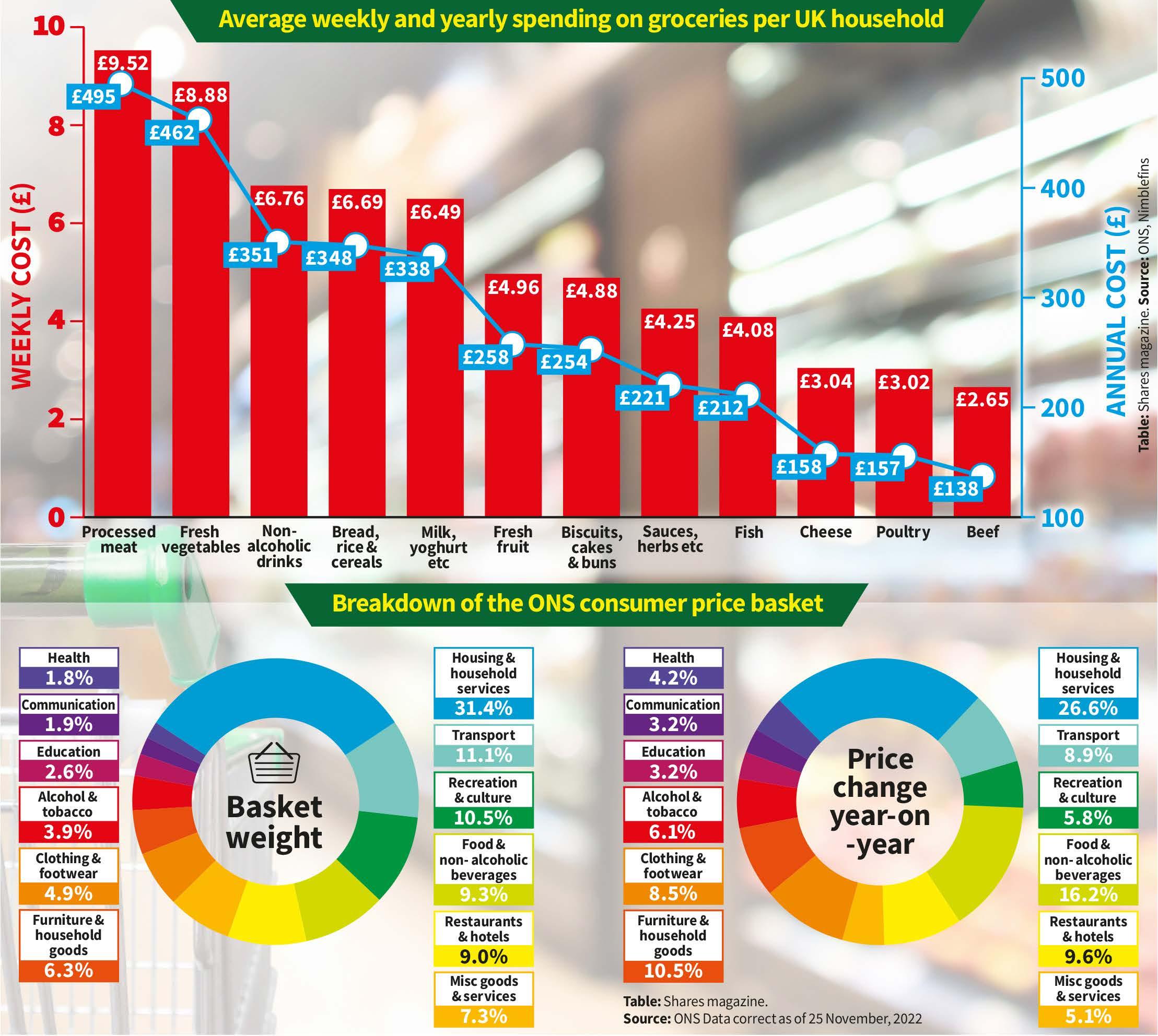
reduce our bills and food waste.
According to spending data from the ONS, the current average weekly food bill for a UK household, excluding alcohol but including nonalcoholic drinks, has risen to £114 which equates to nearly £4,300 per year.
Shares has narrowed the basket down to the five categories which take the biggest bite out of our weekly budget: processed meat, fresh fruit and vegetables; soft drinks; bread, rice and cereals; and milk and yoghurts.
Together, these account for over £43 of the weekly shopping basket or more than a third of take-home grocery spending.
From this, we can make an educated guess as to which brands the typical shopping basket might contain and which companies are set to benefit from the increase in spending.
The global soft drinks market is dominated by beverages firm Coca-Cola (KO:NYSE), whose nonalcoholic offerings span everything from CocaCola, one of the world’s most famous brands, to household favourites such as Fanta, Oasis, Schweppes and Sprite.

Although the company was incorporated 130 years ago, it has kept up with changing tastes and as well as soft drinks it owns the Costa coffee brand and energy drink Powerade.
Last year Coca-Cola generated global revenues of $38.7 billion, and after a stronger-than-expected third quarter organic sales are seen rising by between 14% and 15% this year despite a 7% currency headwind.
Coca-Cola’s shares trade on the US stock market but they can easily be bought by UK investors. A $5,000 investment into Coca-Cola’s shares 10 years ago would be worth $11,510 today including dividends, a 130% total return.
While the strain on household budgets may be a headwind for some branded food products, Premier Foods (PFD) continues to increase its market share thanks to a portfolio including some of the nation’s best-loved products combined with tasty product innovations.
The maker of quintessentially British goods like
Homepride, Loyd Grossman, Sharwood’s and the recently acquired Asian ingredients label The Spice Tailor. A £5,000 investment in Premier Food’s
shares 10 years ago would be worth £8,475 today including dividends, a 69.5% total return. Kellogg’s
Fancy investing in a company that owns some of the most iconic breakfast and snack products in the world? Many products from US food producer Kellogg’s (K:NYSE) are a must-have for millions of people in their weekly shopping basket.

Its shares are listed on the New York Stock Exchange and can be bought and sold on the big UK investment platforms. Someone who invested $5,000 in Kellogg’s 10 years ago would have seen the value of their investment turn into $9,090 including dividends, an 82% total return.
In June, the company announced it would separate into three public companies. It will retain the core global snacking business while spinning off the North American cereal operations and a smaller entity which sells plantbased foods.
The global snaking business is home to such
names as Pringles, NutriGrain, Pop Tarts and big cereal brands including Corn Flakes, Frosties, Coca Pops and Special K. The North American cereal arm contains likes of All-Bran, Rice Krispies, Apple Jacks and Froot Loops.
The advantages of breaking up the company mean each division can be more focused on what they do best. It allows for greater freedom to innovate rather than simply being part of a giant conglomerate.
Typically, when a company splits into multiple parts, investors holding shares in the parent company are given free shares in the demerged entities.
Once Kellogg’s has split into three, the global snacking arm is expected to be higher growth than the historic Kellogg’s group, with an increased focus on emerging markets.

Catering to our carnivorous side, Cranswick (CWK) is one of the UK’s leading producers of fresh pork, sausages, bacon, chicken, cooked meats, and ready-to-eat meat products, as well as side dishes and gourmet pastries.

In the six months to September the firm turned over more than £1.1 billion, an increase of 10.7% on last year on a like-for-like basis, as it passed through higher input costs to its customers.
The firm continues to expand production capacity to keep up with demand, such as a third contract cooking line at its Hull cooked bacon
facility and a new breaded poultry facility to supply the retail and food service markets.
Investment bank Berenberg says: ‘While industry challenges are unlikely to abate anytime soon, we have confidence that Cranswick can continue to solidify its market position and make strong underlying progress, something that we think will be highly visible when industry fortunes start to turn.’
A £5,000 investment in Cranswick’s shares 10 years ago would be worth £24,058 today including dividends, a 381% total return.
Swiss firm Nestle (NESN:SWX) is truly a giant in the food industry with annual sales of almost $100 billion, more than double those of Coca-Cola.
As well as Nestle yoghurts and cereals, the company owns the Nescafe and Nespresso coffee brands, the KitKat chocolate brand, San Pellegrino water and fruit drinks, and the Purina pet food brand which has become a huge money-spinner as pet ownership has boomed.
Meanwhile, its Maggi noodles are hugely popular in emerging markets, and it also owns SMA infant nutrition which is over 100 years old and has a global reach.
Chief executive Mark Schneider recently set out new margin and earnings growth targets which were above analysts’ forecasts.
Nestle’s shares trade on the Swiss Exchange, yet UK investors shouldn’t have any problems
buying the stock in their ISA or SIPP (self-invested personal pension). Someone who bought CHF 5,000 worth of Nestle shares 10 years ago would
have seen the value of their investment including dividends grow to CHF 12,375 today, a 148% total return.
Consumer goods colossus Unilever (ULVR) owns a portfolio of what could almost be called ‘essential’ British brands, from Colman’s mustard and Hellman’s mayonnaise to Magnum ice creams and love-it-or-loathe-it Marmite spread.

It also has huge home and personal hygiene businesses with brands like Domestos, Persil and Surf on the one hand and Dove, Lynx, Simple and TRESemme on the other.
While we may not buy these brands every week,
it’s likely that the monthly bill for most of us includes some Unilever products.
The firm recently raised its full year sales growth forecast after third quarter revenues increased more than 10% and promised higher margins next year as it improves its pricing and product mix.
A £5,000 investment in Unilever’s shares 10 years ago would be worth £12,055 today including dividends, a 141% total return.

We hear from the experts about the stocks and sectors which are exciting them the most
As 2022 draws to a close amid continuing market volatility Shares has canvassed leading fund managers to find out where they have been finding the best opportunities.

We have spent the last 12 months trying to find opportunities within the growthier area of the market – our favoured part of the market and the part of the market that has been hit the hardest.

For example, we have initiated new positions in Deutsche Borse (DB1:ETR), music content owner Universal Music (UMG:AMS) and biopharma equipment company Sartorius (SRT:FRA).
Universal Music owns almost a third of global recorded music, streaming is driving strong growth in listening hours, industry pricing is starting to move higher and the valuation of the company doesn’t seem to reflect the long term opportunity in our view. In the shorter term, consumer weakness is weighing on the share price performance and creating the opportunity for investment.

Man Group (EMG), one of the world’s biggest hedge funds, is a company we see as unique amongst its peers. Volatility in markets is leading investors to look for uncorrelated returns, investments that can perform differently to the prevailing market.
Man Group has transformed its quantitative analysis capabilities to a degree that we believe leaves other asset managers behind. This technological development offers growth opportunities from its existing client base, higher fee capital and growth potential. We believe this makes Man Group an example of the future of fund management and could lead it to break into the FTSE 100.






The most recent purchase in the trust is Texas Instruments (TXN:NASDAQ) or TI for short. TI designs and manufactures relatively ‘simple’ analogue chips that don’t require the latest manufacturing technology and have incredibly long shelf lives.
While other semiconductor companies must constantly design and manufacture new CPUs to satisfy the insatiable need for greater computing power, TI chips work for decades. The result is a business with little technological risk and relatively low capital intensity.




The semiconductor industry has a degree of cyclicality, however in the case of TI, we consider this risk to be mitigated by having a conservative balance sheet and capital allocation policy that rewards long-term shareholders.

The business is fantastically profitable, ranking in the 89th percentile of S&P 500 companies in terms of free cash flow margins. Cyclical concerns gave us an attractive price at which to invest.
The market’s shorter-term focus on macro issues is leading to interesting stock mis-pricings that our managers are seeing across a wide spectrum of sectors and regions. We have investments in good quality companies that are performing well right now in this period of high inflation.
We are also seeing opportunities in a select few growth stocks that are perhaps now becoming oversold, but also in smaller cap and value stocks which are now looking excessively cheap. For example, Kyndryl (KD:NYSE) is small cap company but one of the largest managed IT services companies in the world. It was spun out of IBM in late 2021.
The shares are lowly rated as the company has been emerging as a business that is no longer captive to IBM products and can compete more freely across the entire range. If it can move to industry margins from current break-even then we see substantial upside.
We are excited about the prospects in emerging markets and believe the best time to buy is when sentiment is low. Right now, we are close to an all-time valuation low compared to developed markets. Our largest exposure is Asia where we keep finding some of the most attractive investment opportunities. India, for example, is a $3 trillion economy today and has overtaken the UK to become the world’s fifth largest economy.
While the developed world remains worried about inflation, it is largely under control in India at 7% and is expected to peak soon. India is expected to keep up its growth trajectory and grow faster than other major economies at 6.8% this year.
We do not invest in the large Indian companies. We are finding smaller, lesser-known companies that are carving a niche for themselves and growing much faster.
For example, we invested in Persistent Systems (PERSISTENT:NSE)
This Indian technology company offers digital engineering solutions across the globe to small and large companies like IBM (IBM), Wells Fargo (WFC:NYSE), Cisco (CSCO:NYSE) and partners with leading software vendors like Salesforce (CRM:NYSE), AWS and Microsoft (MSFT:NASDAQ)
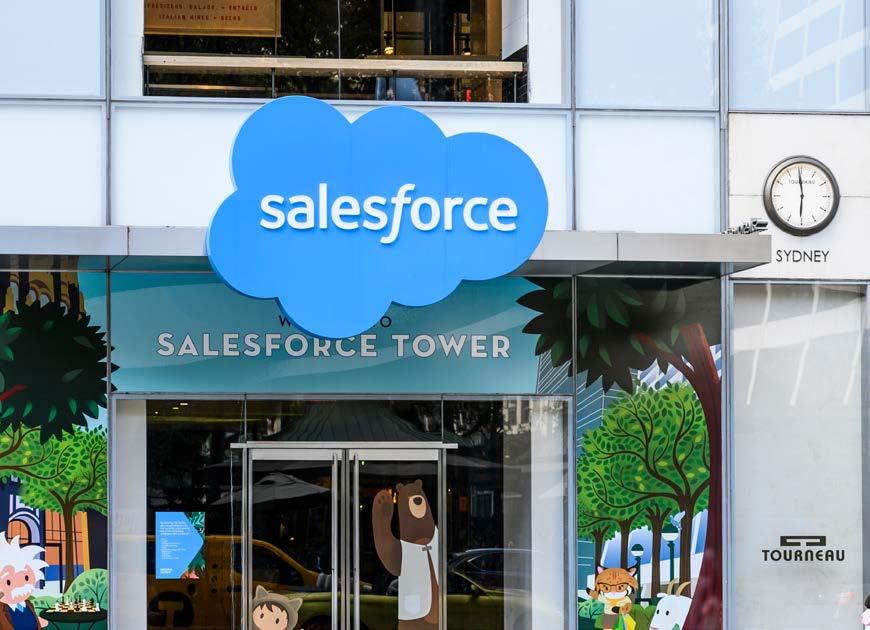
Investor concerns about a deep and prolonged recession are beginning to ease as it becomes clearer that inflation is getting closer to peaking. We see the greatest opportunities in the parts of the market that are most hated, namely financials and consumer stocks. We are finding many leading companies that we believe are capable of delivering meaningful growth on a medium-term view once the current period of uncertainty abates.
At a time of rising funding costs, we expect incumbents to win market share, driving out loss-making upstarts whose business models were reliant upon the continued flow of cheap money. As this is recognised by the wider market, we expect to see a resurgence in industry leaders such as DFS (DFS).





I think prospective returns across UK consumer cyclicals look very compelling. You can understand why – newspapers are full of doom and gloom. We came out of a pandemic and into a war that caused a recession. Despite the various headlines, the fact is that inflation-linked 10-year bonds still have zero returns and the UK has record low unemployment.
In cyclical sectors, valuations have decline by 30% to 50%. Balance sheets were strengthened during Covid, and so most companies will weather the storm. So, I would advocate buying strong franchises in cyclical sectors (e.g. retail/banking/airlines) where my judgement is that three-to-five year returns may be as high as 20% to 30% per year.

As increasing interest rates have brought down asset prices, we have been increasing the weight and number of what we call ‘serial acquirers’ in our portfolio. These are companies that supplement their organic growth with regular small acquisitions in their existing product markets or geographies.
We believe that over time they should stand to benefit from lower valuations of target businesses which will ultimately result in a very profitable boost to their growth.
Now this won’t happen immediately, because price expectations of private business owners never fall as quickly as public stock markets, but over time they will start to come down. Companies we own that fall into this category include Diploma (DPLM), Halma (HLMA), Recordati (REC:BIT) and IDEX (IEX:NYSE).

Before answering this question it’s important to consider the time frame over which we are thinking, as the best opportunities for say the next three months are likely to be very different to those for the next three, four or five years. Our investment horizon is geared to the latter.
This explains why we’re comfortable holding a large position in a UK retailer such as Dunelm (DNLM), which is likely to face challenges in the near-term from consumer weakness, but which should emerge from this difficult period with an even stronger competitive position and even greater earnings power. The market’s myopia, and the company’s ensuing low valuation, make this share even more attractive when looking through this longer lens. This is just one example but there are plenty like it in the UK, where many shares are trading at compelling valuations and thus providing great investment opportunities for the long-term investor.
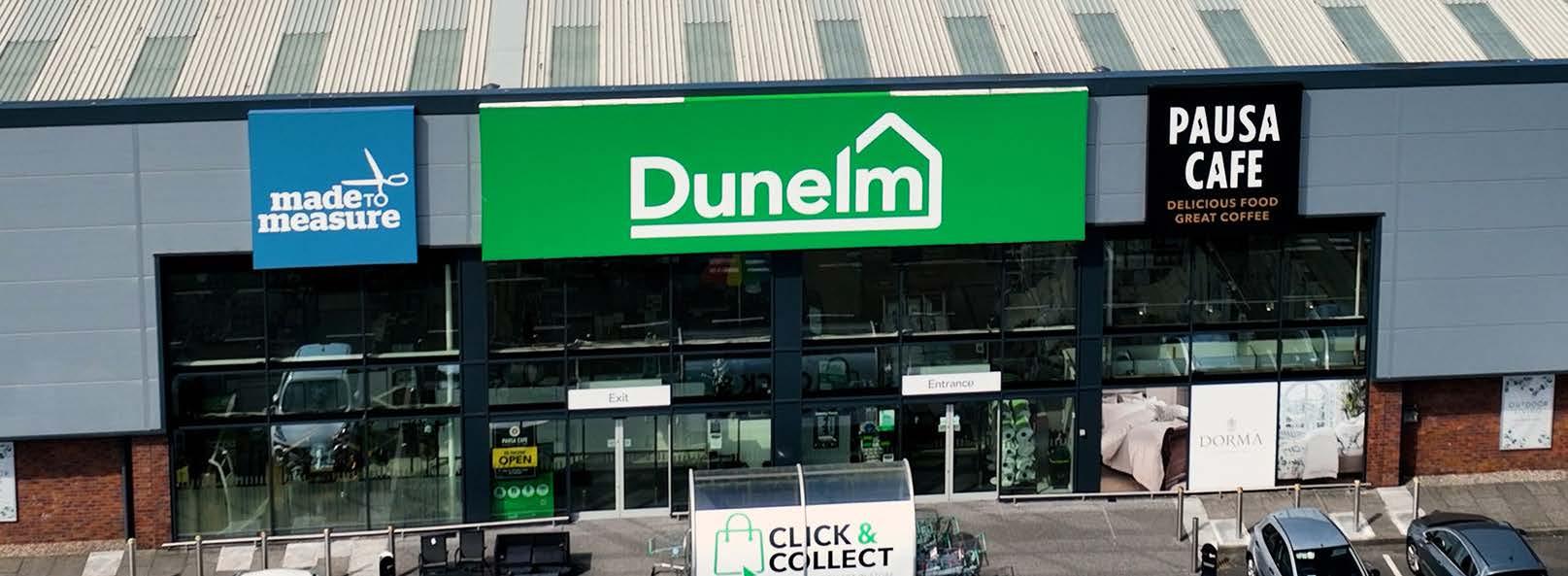
We can see there is a large premium in the market for defensive/noncyclical earnings, for US dollar earnings and for liquidity and strong balance sheets. Smaller companies and micro caps are enormously out of favour following months of outflows and low risk sentiment. This provides fantastic opportunities, and we are fully invested.

We recently added to specialist lender Distribution Finance Capital (DFCH:AIM) which is trading at a 50% discount to book value despite maintaining a 6% net interest margin.
We’ve added to fully funded early-stage growth businesses like Kooth (KOO:AIM) and ActiveOps (AOM:AIM) at very depressed valuations. We’ve also increased our cyclical industrial exposure by adding to SigmaRoc (SRC:AIM), a Northern European quarrying business, and Renold (RNO:AIM), a global manufacturer of chains.
Recent data from the UK Government Insolvency Service illustrates deteriorating economic conditions but should support opportunities for litigation companies Manolete (MANO:AIM) and Litigation Capital (LIT:AIM).


helped drive up valuations, which seems to have created an extreme level of concentration in global indices that may not continue moving forward.
One of the graphs finance people have enjoyed gawping at over the past five years is a comparison between the S&P 500’s performance without the so-called ‘FAANGM’ stocks (Facebook, Apple, Amazon, Netflix, Google, Microsoft) and the performance of those stocks alone.
According to Yardeni Research’s latest data, if you were to rebase the US index to zero at the end of February 2012 and track performance until 18/11/2022, the FAANGM stocks would have increased by 501.5 points. Without those tech companies, the index would have increased in value by 135 points. This remarkable disparity was even more pronounced in 2021, when the FAANGM’s would have been up over 800 points, compared to less than 200 points for the rest of the index.
For active managers in global equities, this has been less of an amusing curiosity and more of a headache. The dominance of big tech in global indices has meant it has been a struggle for most managers to outperform. Those that did were often overweight to these companies, a strategy which is likely to have exacerbated losses in the last 12 months. So it’s been a bit of a case of ‘damned if you do, damned if you don’t’.
Nonetheless, it’s worth thinking about what actually drove FAANGM performance. Even taking into account their performance over the past year, we shouldn’t forget the impressive earnings growth that was often at play. Facebook’s parent company Meta, for example, saw its profits almost quadruple from 2016 to 2021.
However, it’s hard not to see the impact ultra-low interest rates and speculation had as well. Amazon was, for example, trading at more than 100x earnings in mid2020. Its share price has also nearly halved in value in the 12 months to 24/11/2022.
Some investors may claim that these companies are just going to bounce back. That’s plausible but it’s worth thinking about Cisco, a company that was one of the main beneficiaries of the Dot Com bubble in the early 2000s. The firm has still performed well since then in financial terms but it has never reached the all-time high it hit in 2000.

It’s always going to be the case that a small number of stocks will have an outsized impact on an index’s overall performance. But the last five years have witnessed a mix of speculation, in large part driven by monetary policy that
That may be bad for tech fans but it could mean active managers are better able to deliver outperformance for shareholders. And for investors that are looking for core exposure to global equities, Alliance Trust (ATST) may provide a simple solution to their needs.
The trust’s managers, Craig Baker, Stuart Gray and Mark Davis of Willis Towers Watson (WTW), go through a list of hundreds of managers and identify 20 that they believe are likely to deliver the best returns. They then choose managers from that group of 20 to give their highest conviction picks, with the ability to ‘sub in’ managers if they want to. The portfolio is then weighted to achieve optimal diversification and capture what the WTW team believe are likely to be the major drivers of returns.
WTW has been managing ATST since April 2017 but there was some initial drag on performance created by legacy assets that were owned by the previous managers. Speaking at a Kepler Trust Intelligence event at the end of September, Craig noted that although the trust had outperformed its peer group average despite these problems, they had seen annualised underperformance of 0.3% from the time that WTW took up management of the trust until the end of August 2022.

However, a significant point made during the presentation was that if the MSCI ACWI, the trust’s benchmark, was equal weighted then they would have delivered outperformance. A year or two ago that might seem like a moot point. Today it doesn’t.
The reason for that is because of the dynamics described above. If underperformance is solely the result of being underweight six US tech stocks and that is not going to be the case moving forward, it seems plausible that the managers can deliver above benchmark returns in the future.
Indeed, in the year to 24/11/2022 ATST has delivered relative outperformance of its benchmark and is substantially ahead, again on a relative basis, of the average returns delivered by its peers in the Association of Investment Companies Global sector.
Whether or not this will continue moving forward is hard to say. What does seem possible is that the years ahead will see a market whose performance is less dominated by a few mega cap tech stocks. That would mean less gawping at Yardeni Research charts and fewer headaches for active managers.
Click here to read our latest research on Alliance Trust…
70 Conduit Street, London W1S 2GF with registered number OC334771. Full terms and conditions can be found on www.trustintelligence.co.uk/investor
There are some positive early signs for the managers of global investment company, Alliance Trust...Disclaimer
Mark says the volatile market conditions haven’t put him off deploying money in his ISA
Retired civil servant Mark is a relatively late starter when it comes to managing his own investments, but he is making up for lost time – taking up the maximum ISA allowance of £20,000 apiece for himself and his wife each year.
The 61-year-old already has a workplace pension to help fund the cost of living, but that didn’t stop him wanting to start a personal investing journey after finishing work in 2021. ‘I had a significant sum to invest after paying off my mortgage so set up ISA share accounts for my wife and I,’ he says.

Mark explains that he started investing because it gives him something to focus on in retirement. Having read an investment guide when he was still working, he acquired an interest in how the stock market operates and the opportunities it provides.
His 43 years working for HMRC clearly had an influence as the Scotland-based individual stresses the importance of being tax efficient with investments and making full use of the ISA allowances.
Mark says: ‘I am taking a long-term view on returns. In the current challenging environment, I do not expect short-term gains but look forward to returns in the medium to longer term.’ He adds: ‘Luckily I am in a position to play the long game as I am not reliant on income from my ISA portfolio.’
A preference for investment trusts and ETFs (exchange-traded funds) reflects the store Mark sets by diversification and it is evident in his list of investments. He says: ‘I have majored on ETFs as a means of achieving wide diversification but also made some specific stock picks related to mining and minerals. I have also dabbled in crypto by investing in Ripple XRP to get some “skin in the game”.’
Mark is interested in the miners because of their links to the electric vehicle and renewables sectors, saying that by following the leads back down the vertical supply chain ‘you end up in this sector’.
Among his portfolio is Merchants Trust (MRCH) which mainly invests in higher yielding large UK companies. He has money in Temple Bar Investment Trust (TMPL) whose managers adopt a value investing style, as well as commercial property investor Regional REIT (RGL).
Mark shows an interest in big investment themes which could play out over years or even decades, holding funds that provide exposure to areas like robotics and automation as well as the metaverse and battery solutions.
His best performing investment so far is an ETF – Vanguard FTSE 100 ETF (VUKE) which is up 10% on his entry point – and the worst is an individual stock, building materials firm Marshalls (MSLH). This is down 55% and Mark is sitting on an uncrystallised loss of £550.
‘I try not to respond in a kneejerk way when an investment goes wrong. I review my original selection criteria to confirm the “fit” with my portfolio objectives then decide on whether to stick or move funds elsewhere,’ he says.
When it comes to researching ideas, Mark says he uses the AJ Bell platform as a primary source, supplemented by ‘good old Google’.
‘I am constantly scanning all news sources to understand current and future trends from an investment perspective,’ he says.
In terms of what he prizes in a potential investment Mark says: ‘I try to stick to my principles around diversification and maintaining a balanced portfolio. I am looking for a reasonable track record of growth over the medium to long term. This does not rule out individual stock picks as a minor portion of my overall portfolio.’
He adds: ‘I have had friends who have fallen foul of having all their investment “eggs” in one basket in the past and regretted it at their leisure.’
For now, Mark doesn’t have specific longterm goals beyond growing his ISA funds and maintaining an interest in market developments including crypto.

Mark is not overly concerned about the volatility in the digital currency space. He says: ‘I have invested a modest sum mainly to maintain an interest on crypto developments with the understanding I could lose the lot.’
Over the long run he believes crypto will be ‘a disruptive technology for the financial sector’. He adds: ‘It remains to be seen how this will play out in terms of cross border payments and how quickly the finance industry can realign to make the technologies work. There are likely to be significant winners and losers as this plays out. It not an investment environment for the faint hearted.’
DISCLAIMER: Please note, we do not provide financial advice in case study articles, and we are unable to comment on the suitability of the subject’s investments. Individuals who are
unsure about the suitability of investments should consult a suitably qualified financial adviser. Past performance is not a guide to future performance and some investments need to be held for the long term. Tax treatment depends on your individual circumstances and rules may change. ISA and pension rules apply.
Financial services company AJ Bell referenced in this article owns Shares magazine. The author of this article (Tom Sieber) and the editor (Daniel Coatsworth) own shares in AJ Bell.
Baillie Gifford Positive Change B Acc
Baillie Gifford US Growth Darktrace
ETC Group Global Meterverse ETF USD Acc Invesco Physical Gold ETC GBP IP Group
iShares Core S&P 500 ETF USD Acc
L&G ROBO Global Robotic and Automation ETF GBP Marshalls Merchants Trust
Polar Global Technology I Inc GBP Regional REIT RELX
Scottish Mortgage Temple Bar
Vanguard FTSE 100 ETF GBP Acc
Vanguard FTSE All-World UCITS ETF GBP
Vanguard FTSE Developed World ex-UK Equity Index £ Inc
Vanguard FTSE Emerging Markets ETF USD Acc
WisdomTree Battery Solutions ETF USD Acc
Table: Shares magazine • Source: Investor's own records
By Tom Sieber Deputy EditorCompanies like Apple (AAPL:NASDAQ), Microsoft (MSFT:NASDAQ), Advanced Micro Devices (AMD:NASDAQ) and Mastercard (MA:NYSE) have these qualities in spades. They have also generated high and sustainable returns on capital over years, arguably the most important point of all for compounding gains for investors.
These are just some of the companies that Mike Seidenberg has been buying this year, the new lead manager at the Allianz Technology Trust (ATT). He took the lead role in July, replacing Walter Price after he’d run the trust for 15 years.
Few portfolio managers have escaped the global stock market sell-off, but tech has been plagued more than most. For example, the Nasdaq index, often used as a barometer of the sector’s health, is down 27% this year, compared to a 14% decline for the S&P 500.
The reason to still invest in this space is to get exposure to clear structural trends capable of delivering above-average investment returns over years. The technology sector is chock-full of companies with large and sustainable competitive advantages, pricing power and strong cash flows in markets where there are long runways for future growth.
What followed was a portfolio review that has resulted in the £912 million trust steering itself along a more value-oriented path. ‘We went through every stock, name by name, asking if the investment case still stands up,’ Seidenberg said. He had become concerned about the macroeconomic backcloth and rising interest rate environment, and what that might do to cost of capital calculations.
Investors cannot escape the impact of rising interest rates, regardless of the structural trends supporting technology companies. Rising rates lead to an increased cost of capital which, given the often younger, less mature business models of technology firms relative to non-technology companies, can dawn as a painful reality.
Stakes in more than a dozen stocks were trimmed, in some cases considerably, including Tesla (TSLA:NASDAQ), albeit for different reasons. The electric car firm had been in the portfolio for years but a combination of multiple stake top-ups

How Allianz Technology has reshaped its portfolio for a better future
and the stock’s strong run saw the trust trim its stake. Tesla stock has soared about 570% since the start of 2021, accounting for share splits.
Seidenberg continues to believe that Tesla has a ‘really great runway’ of growth potential but it had become ‘too overweight’ in the portfolio, especially given the loose cannon nature of Elon Musk. ‘I’m OK with [him buying] Twitter as long as he doesn’t spend too much time on it,’ said Seidenberg.
These sales have been matched by corresponding purchases. Examples include Bumble (BMBL:NASDAQ), the femalefocused dating app, and Aspen Technology (AZPN:NASDAQ), the developer of software for the oil industry. The team have also been adding to several companies which have been posting strong results during the recent market downturn.
The process was designed to give the portfolio a level of stability it might have lacked before but without departing from its historic remit. One of the major differences between Allianz Technology and its Dow Jones Global Technology index benchmark is the trust’s typically larger weighting to mid-cap technology companies.
This overweight reflects the greater growth potential Seidenberg and his team see in smaller, more nimble companies, and it also reflects the huge weighting the benchmark has to mega-cap technology companies, given their enormous market caps.
‘This means that Allianz Technology offers investors a refreshing take on global technology investing, allowing them access to the sector without increasing their often large pre-existing exposure to the household technology names which are often a feature of many global or UScentric funds,’ says Kepler analyst David Johnson.
Today innovation in technology is transforming virtually every industry. From electric cars loaded with electronics to online shopping, how we consume entertainment using cloud computing to providing solutions to keep us safe from crooks and other internet threats.
These have encompassed new stakes in cybersecurity firm Fortinet (FTNT:NASDAQ) plus Visa (V:NYSE) and Amazon (AMZN:NASDAQ).
That we are relying on technology to solve many of the world’s biggest problems; climate change, how we feed and power the world in the years to
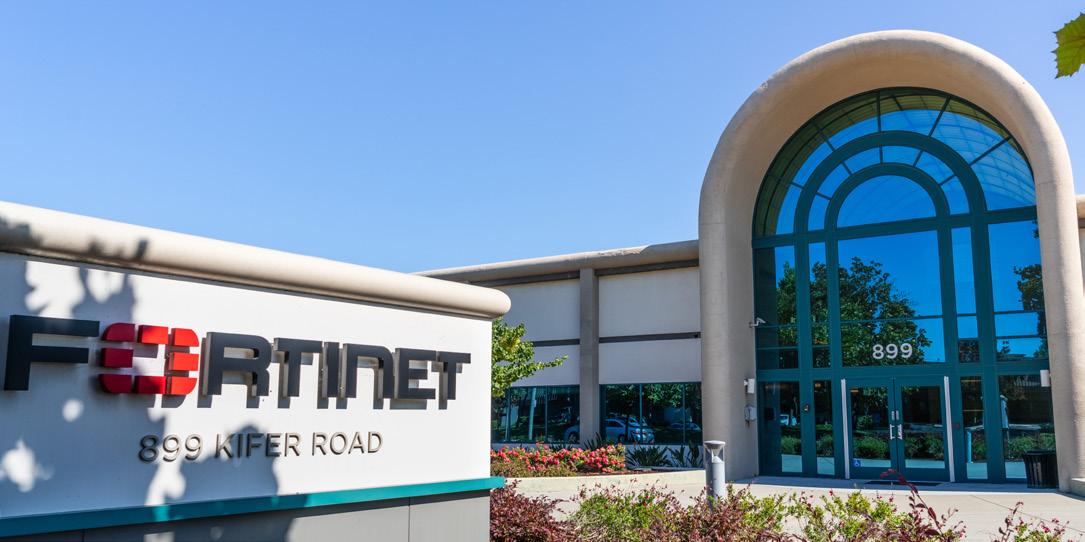
come, and medical breakthroughs that will allow future generations to live longer, happier lives, means technology exposure should be an essential investment theme to consider.
While Allianz Technology has not been immune to the 2022 sell-off, it still retains a long-term track record of outperformance, beating both its benchmark and its closest peer – Polar Capital Technology Trust (PCT) – over the last five years, up 98% versus 68% respectively.
points out that this now means that the trust’s discount to net assets has widened to 14.2%, near to its widest levels over the last five years. ‘Prior to 2022 Allianz Technology had not traded at a sustained double-digit discount since 2015,’ says Johnson.

Demand for core themes like cybersecurity, artificial intelligence and machine learning, cloud computing, increased connectivity, e-commerce and healthcare breakthroughs hasn’t gone away, but for the time being, tech funds may find ordinary investors reluctant participants until stock market performance improves.

Yet there is no getting away from 2022’s poor performance, with Allianz Technology shares 35% lower than where they began the year. Kepler
By Steven Frazer News Editor






















































Normally the markets price in a football boost for pubs ahead of time but it's all a bit different in 2022
Football’s World Cup and a boost to hospitality spend normally go together like, well beer and football, but this year’s tournament is a bit different.
And while the market often prices in the impact of a major football tournament ahead of time, a winter World Cup has left investors somewhat on the back foot when it comes to predicting exactly how the chips are going to fall for the sector this Christmas.

There’s no doubt England’s successful progression to the quarter finals will tempt some supporters out to their local hostelry to watch the match in the company of like-minded fans but they might go instead of attending the work Christmas do or perhaps that night out will come at the expense of another festive meet up with a few friends.
Will a winter tournament change consumer behaviour, especially when that consumer is wrestling with the cost-of-living crisis? Will they settle for a case of supermarket beer at home rather than perfectly pulled pints in the pub?

Just looking at share price performance since the start of the competition, investors do seem to have warmed up to the possibility that despite the controversy about both venue and timing of the tournament fans simply won’t be able to ignore the lure of an England team on the prowl for glory.
Pub chains Mitchells & Butlers (MAB), Fuller, Smith & Turner (FSTA) and Marston’s (MARS) have all enjoyed a bit of a bump since November as scenes of jubilant fans knocking back a barrage
Chart: Shares magazine • Source: Refinitiv
of bevies are beamed onto news programmes and social media platforms.
Marston’s like for like beer sales during the first two World Cup games were up a whopping 50% compared to the same period last year. It’s latest results show a return to profit but warn of squeezed margins so any opportunity to grab additional trade will be welcome.
JD Wetherspoon (JDW) is an unsurprising outlier; despite the fact the pub chain has relaxed its stance on football for the tournament it’s decision to keep the sound on mute has rather dampened investor appetite with many wondering if that will be a strike for or against Tim Martin’s chain.
Wagamama owner The Restaurant Group (TRG) has also failed to chime with investors perhaps curious as to whether cash strapped consumers
will be forced to cut back on the noodles to pay for pints – chipping away at crucial Christmas trade.
A World Cup Spending report compiled by the VoucherCodes.co.uk website at the start of November 2022 estimated that UK fans will spend a whopping £278 million on drink over the course of the tournament – equating to 65.3 million pints of beer. The website estimates consumers will spend rather less on food, based on previous World Cup consumption around £117 million, but the big question is where will they spend it?
During the last World Cup back in 2018 Domino’s Pizza (DOM) saw sales on England match days rise by an average of 15.2%, but the day of the week on which the games were played made a big difference, with weekdays providing the biggest boost and Saturday matches working against the pizza giant.
Sales increase versus normal weekday on day of England's semi-final vs Croatia in 2018
 AJ Bell Financial Analyst
AJ Bell Financial Analyst
And how will a national rail strike play into this particular game? The semi-final match dates fall uncomfortably on the first of the RMT’s planned December walk outs and the date of the final is likely to be dogged with delays and disruption as services struggle to resume after a second round of strikes.
UK hospitality has already warned that industrial action on the railways could cost the sector £1.5 billion in lost sales – a similar figure to that estimated to have been lost to beleaguered businesses following disruption caused by a surge in the Omicron Covid-19 variant last year.

The sector had hoped this Christmas would finally deliver an uninterrupted run, a period when plans didn’t require rearranging or worse, cancelling altogether. Many workplaces held their Christmas parties in January last year and some might well be considering taking the same action for a second time in a row.
At least the football can be enjoyed without travelling far, if at all. Local pubs are likely to become meccas, although both pubs and homes will likely find themselves longing for the summer’s big bonus – an extra room in the garden.
Another would be winner of this winter’s World Cup appearance is ITV (ITV). The broadcaster’s hugely important advertising revenue was down £26 million in the nine months to 30 September and the prospect of recession was clearly something the company was thinking carefully about.
There are big ifs and no one wants to jinx what comes next, but if football were to truly come home, well that could shift sentiment for more than just ITV.
It can be hard to shift your thinking once committed to an investment case
It is easy to become ensconced in a narrative and ignore contrary new information which doesn’t fit with your thinking. But at some point, the penny drops, company plans go awry, and investors abandon the story.
This article highlights stocks where investors appear to have changed their collective minds on a company’s prospects. All the companies in the article have suffered a dramatic derating.
A derating refers to a falling PE (price to earnings) ratio. Part of the fall reflects higher interest rates,
but the bulk of the rating change is down to investors abandoning the prior narrative.
HAS FACEBOOK-OWNER META LOST ITS WAY?
The alluring narrative for Facebook-owner Meta Platforms (META:NASDAQ) is its dominance in online advertising alongside Google’s parent Alphabet (GOOG:NASDAQ) and its vision to be at the centre of the Metaverse.

The story seems to have lost some of its shine for investors in recent months after the brutal sell-off in US technology stocks. Meta, which also owns Whatsapp and Instagram, has been one of the worst performers with its shares falling 72% from the peak, while its forward PE has halved to 12-times.
In its most recent update (27 October) Meta’s shares plunged more than 20% to trade at their lowest price in seven years after third quarter earnings missed estimates and revenue fell 4% year-on-year. The company also lowered guidance and announced job cuts.
Meta is facing increasingly stiff competition from the likes of TikTok, Snap and YouTube, who are eating its lunch among younger consumers.
The worries seem to be mounting. Increased
competition in advertising, slower ad spending amid a decelerating economy and huge sums spent on developing its Metaverse.
According to Neil Campling, technology analyst at Mirabaud Securities, the spending on the Metaverse is expected to cost several billion dollars over the next few years.
Scott Kessler, an analyst at Third Bridge, noted that as Meta’s revenue has fallen in the past two quarters and its spending increased, its free cash flow plummeted. In the third quarter, Meta’s free cash flow was $173 million, compared with $9.5 billion a year ago.
But some investors are sticking to their guns despite the collapse in the shares. In his half year report Fundsmith founder Terry Smith acknowledged the possibility that Meta could be a value-trap but maintained the fund’s holding.
Smith commented: ‘Meta’s stock now trades on a FCF (free cash flow) yield of 8.7%. At this level it is either cheap or a so-called value trap. We will let you know which when we find out, but we are inclined to believe it is the former.’
As a growth stock with no profits, it isn’t surprising online food retailer and robotics company Ocado (OCDO) has seen its shares drop 76% over the last year.
The message from analysts’ earnings revisions has been clear with estimated full-year net losses to the end of November more than doubling to almost £400 million.
The online food retail disrupter has always polarised investors from the first day it listed on the stock exchange in 2010 at 180p.
The bullish narrative (the world’s largest pureplay online grocery business) has had a long shelf life, but perhaps it is reaching its sell-by date.
Nevertheless, the company seemed committed to expanding its OSP (Ocado Smart Platform) and in July raised £575 million of additional capital from investors at 795p per share.
Ocado’s 12-year profitless record surpasses the mighty US retailer Amazon (AMZN:NASDAQ) which didn’t turn a profit for five years after floating in 1995.
It’s hard to fault the execution at multi-platform
EPS (p)
168.12 168.17 168.17 168.17 170.37 171.23 169.97 169.97 168.72 168.49 168.60 161.65
Chart: Shares magazine • Source: Stockopedia, Refinitiv, Shares. Year End 30 Sep
digital publisher Future (FUTR) which has more than delivered against market expectations over the last 18 months.
It makes the 65% fall in the shares since August 2021 a tad puzzling. The forward PE has dropped from 25 to 8.8-times.
Perhaps investors are sceptical the successful acquisition-fuelled growth can continue at the same pace.
There were signs of a potential slowing at the recent full year results (30 November) when the company only guided for modest growth in 2023, leading to analyst downgrades.
As well as suffering from growth stocks going out of fashion, the weak recent sentiment towards Future also reflects concern about the outlook for advertising in a difficult economic backdrop.
And while change at the top is not necessarily a bad thing, in September CEO Zillah Byng-Thorne announced she would step down by the end of 2023.
She said ‘good progress’ had been made in identifying a successor and that chief financial officer Penny Ladkin-Brand would have her role extended to group CFO and strategy officer.

Language technology services company RWS (RWS:AIM) has seen its one year forward PE shrink from 23-times a year ago to just 12.8.
In retrospect the PE a year ago was too high and earnings growth has subsequently slowed.
The investment narrative at RWS took hold after the all-share merger with SDL in November 2020. It was seen as a transformational deal which bolstered RWS’s leading market position in a structurally growing market.
The deal was widely seen as a win-win which brought together RWS’s specialist technical translation and localisation capabilities with SDL’s software, machine translation and AI expertise.
The two firms only represented around 2% of the
highly fragmented $50 billion market for language services, implying a big growth opportunity if the deal worked out as intended.
It got off to a great start with RWS increasing synergies guidance to £30 million. However, synergies were unlikely to move the profit needle as they only represented around 4% of sales.
The first cracks appeared less than a year after the deal had closed when long-term CEO Richard Thompson left the business. At the time investment bank Berenberg said: ‘We do not believe that a change in CEO alters our RWS investment case.’
A takeover approach in April 2022 by Private Equity Asia turned out to be a red herring and came to nothing.
After a capital markets day in the spring of 2022 hosted by new CEO Ian El-Mokadem Canaccord Genuity published a note titled, ‘no pain, no gain’ referring to a temporary reset of margins which it said ‘creates a long-term buying opportunity’.
The company outlined a plan which included a significant investment to streamline the software stack and expand into the faster growing AI data annotation market. Operating margins were expected to drop temporarily by 2.25 percentage points to 15%.
Then in October Canaccord Genuity downgraded the shares to ‘hold’ based on a darkening macroeconomic outlook.
Global recession worries are causing ‘belt tightening’ and pressuring corporate budgets which Canaccord estimates will impact around 40% of RWS’s sales.
The broker estimates Alphabet, Apple (APPL:NASDAQ) and Microsoft (MSFT:NASDAQ) generate close to 20% of sales for RWS.
To make matters worse employee costs are almost half of sales at RWS which means it is vulnerable to wage inflation.
Some fund managers see opportunity where others see problems. Odyssean Investment Trust (OIT) believes the strategic shift by the new management team will drive earnings.
By Martin Gamble Education Editor
George Bennett,
Rainbow Rare Earths Ltd strategy is to identify near-term, secondary rare earths production opportunities. Meeting escalating demand for critical minerals needed for global decarbonisation, we are focused on producing the magnet rare earth metals neodymium and praseodymium (“NdPr”), dysprosium and terbium.

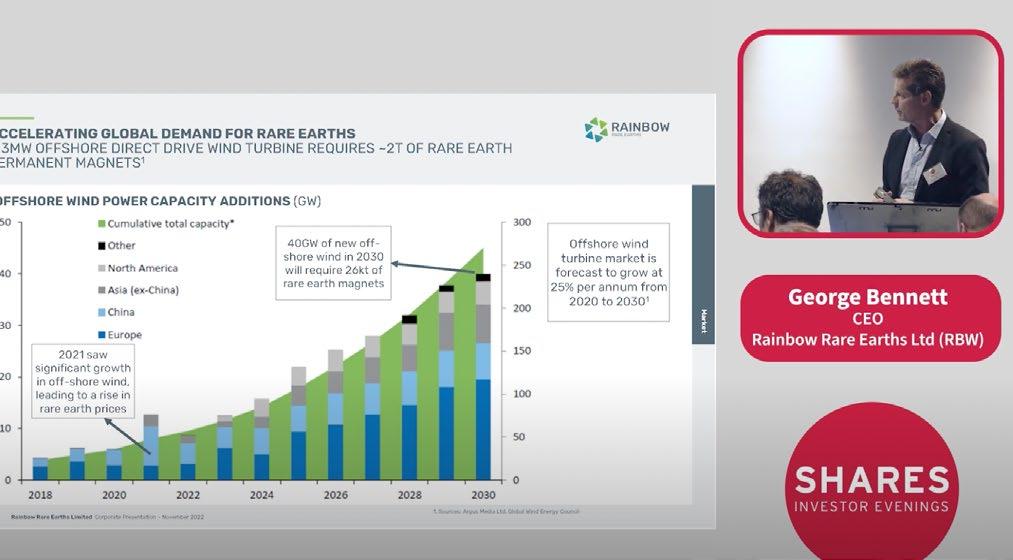
Colin Evans, CEO
Thruvision Group are global providers of fast, safe and respectful people security screening technology for transportation, border control and loss prevention.

Visit the Shares website for the latest company presentations, market commentary, fund manager interviews and explore our extensive video archive.



Adam Davidson, CEO
Trident Royalties PLC plan to rapidly establish itself as a diversified mining royalty and streaming company, providing investors with exposure to base and precious metals, bulk materials (excluding thermal coal) and battery metals.
www.sharesmagazine.co.uk/videos
I have three questions in relation to the lifetime allowance. What happens if you have an excess at age 75, but essentially do nothing: neither take income or a lump sum? I guess you are sent a tax bill by HMRC on the excess at 55%. Is that correct? Can you pay this out of funds external to the SIPP? I understand that the SIPP beneficiaries can receive their share of the deceased’s SIPP as a pension. Can they receive it as a SIPP? If so, what do they need to do to make it happen?
Anonymous
The lifetime allowance is currently set at just over £1 million (£1,073,100 to be exact) and applies to all your UK registered pension schemes (this doesn’t include the state pension). If you exceed the lifetime allowance, you will pay a lifetime allowance charge on the excess. The level of this charge will depend on how the excess is dealt with:
• If taken as a lump sum, the charge will be 55% with no income tax to pay;

• If retained in the pension to provide an income (whether immediately or at a later date), the charge will be 25% with income tax to pay on top.
HMRC (HM Revenue & Customs) will test how much lifetime allowance you have used when certain ‘benefit crystallisation events’ occur.
These events include (but are not limited to) buying an annuity, taking your tax-free cash, entering drawdown, starting a scheme pension, death (if you die before age 75) or reaching your 75th birthday. After the age 75 test, you will not usually be subject to any further lifetime allowance tests.
If the objective is to pass funds on within a pension and you don’t access it before age 75, the lifetime allowance charge on any excess will be 25%. This charge will be taken from your pension automatically by your pension provider and paid to HMRC.

The 55% tax charge only applies if you withdraw the excess amount from your pension as a lump sum before age 75. Again, this would be taken from you pension automatically and you would be paid the balance of 45%.
Pensions offer a tax-efficient route to pass money on to loved ones after you die. If you die before age 75, your pension pot can be inherited free of income tax. If you have not accessed your pension in your lifetime then your funds would be tested against the lifetime allowance on your death.
If a lifetime allowance charge arises, whoever receives your pension benefits would be personally liable to pay the charge to HMRC. If you die after

Our resident expert answers on the limits which apply to tax relief on retirement savingsTom Selby, AJ Bell Head of Retirement Policy, says:
age 75 there is no further lifetime allowance test (as your pension will have been tested on your 75th birthday) but it will be taxed as income when your beneficiary or beneficiaries access the money.

To ensure your beneficiary or beneficiaries have the option of keeping the funds in a pension, you need to provide your pension administrator with details of who you would like to receive your pension on your death. They should then have the option of taking the money as a lump sum or transferring it to a pension in their own name with a provider of their choice.
Send an email to asktom@sharesmagazine.co.uk with the words ‘Retirement question’ in the subject line. We’ll do our best to respond in a future edition of Shares.
Please note, we only provide information and we do not provide financial advice. If you’re unsure please consult a suitably qualified financial adviser. We cannot comment on individual investment portfolios.
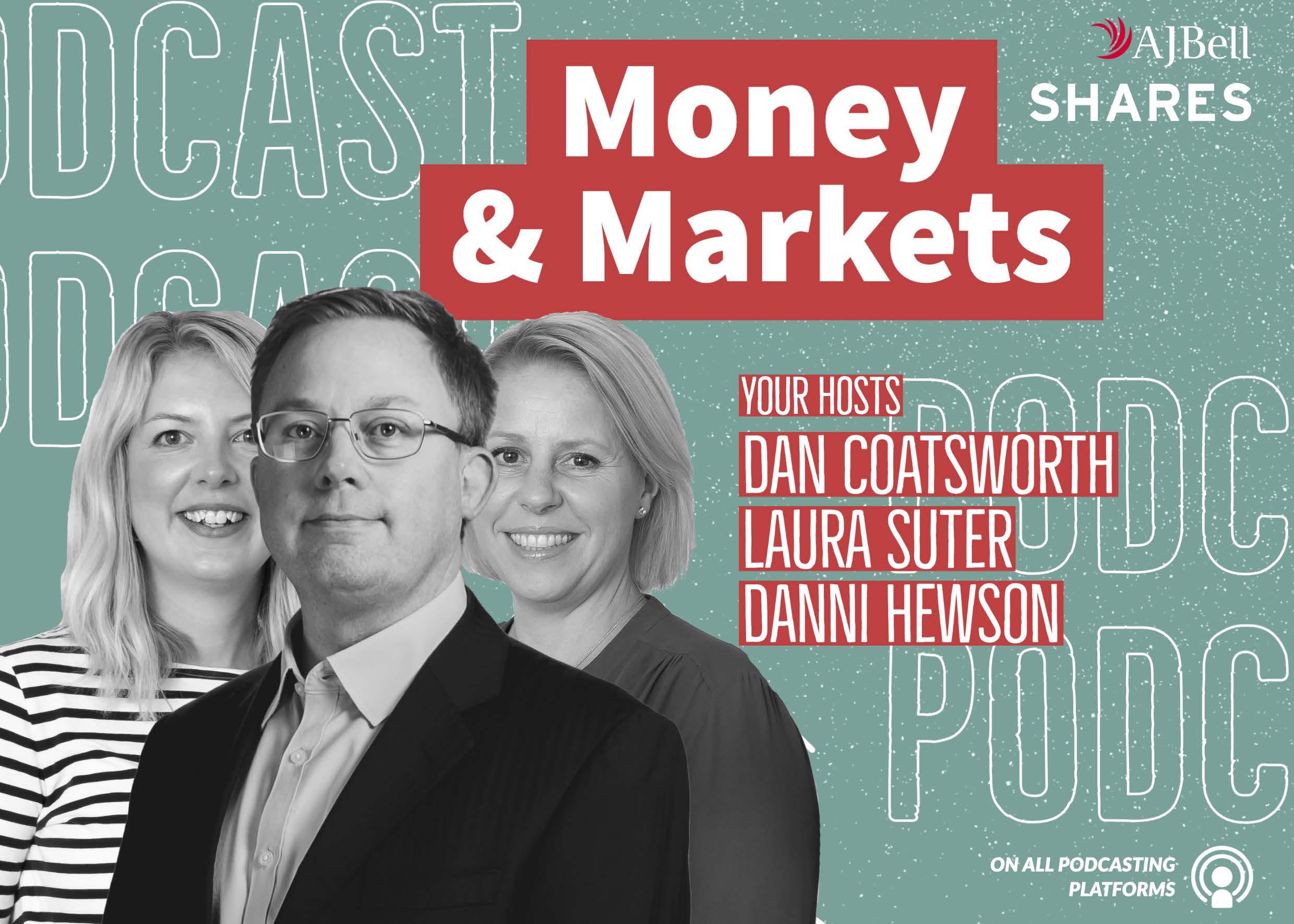
Looking at the times when paying extra to get professional help with your money could be worth it
The financial watchdog has just launched a consultation on introducing a new core investment advice service to the market. The basic idea is that reducing regulation around this form of simplified advice will result in lower fees, and so more consumers choosing to invest rather than being stuck in cash.
The issue is that fully fledged, holistic advice currently costs around 1% to 3% of the investment sum, often with minimums of £500 or more. Clearly this only becomes economic for investors with bigger portfolios. At the same time, it’s never been easier to be a DIY investor with all the tools and information now available online. But while many investors are now confident about going it alone, there are still times when seeking professional financial advice is the sensible thing to do.
pension planning. Everyday pension saving doesn’t really necessitate the services of a professional adviser, for instance if you simply want to set up a regular SIPP contribution in addition to your workplace pension. But if you’re a high earner bumping up against the annual allowance, or the lifetime allowance, an adviser could earn their crust by helping you avoid the nasty tax charges that follow from breaching these allowances.
Generally speaking, financial advice is most called for when there are large amounts of money on the line, and a great deal of complexity. These two categories can often intersect when it comes to
Transferring out of a defined benefit pension like a final salary scheme should also be an endeavour considered under the guidance of a specialist financial adviser. The value of the guarantees provided by a defined benefit scheme can be hard to uncover and assess. Features like inflation-linking, a spouse’s pension, and early retirement options can often be overlooked or underestimated. A professional financial adviser can help you get to the bottom of these issues, as well as providing an idea of the growth rate you would need on your assets to match the income of your defined benefits scheme, if you were to transfer out.


You may also find the services of a financial adviser helpful as you approach retirement. This is a tricky period to negotiate in which you will transition from earning an income to relying on your assets to cover your expenditure. An adviser can help you decide how to draw an income from your pension without taking too much risk. They can also conduct a cashflow analysis to ensure you’ve got enough assets to fund the retirement you need, and what steps you might be able to take to improve the situation if not.
Mitigating inheritance tax is another area where an adviser should be able to provide some meaningful help. This is an extremely complex area and mistakes can be costly for your beneficiaries. An adviser can help you make the most of your annual gift allowances, setting up trusts for beneficiaries, using pensions, or investing in AIM shares to try to reduce your liability. This is also a pretty uncomfortable subject area for families to discuss, and it can actually help to have a professional adviser there to guide the conversation in the right direction.
over your finances and get them into shape, such as following a divorce, or if you’re moving overseas. When many people think of financial advisers they probably conjure up an image of someone in a pin stripe suit, with a flash watch, a Jaguar, and a distinct lack of interest in their clients’ financial affairs if it compromises their tee-time on the golf course. There’s probably a kernel of truth to this stereotype but it harks back to a bygone era of the 1980s and 90s. Today financial advice is much more professional than it used to be, thanks in no small part to increasing levels of regulation over the last 20 years or so.
Finding a financial adviser is also straightforward nowadays with websites like unbiased.co.uk letting you search for a financial adviser online, depending on what exactly you need help with. But also don’t discount sounding out friends for any positive or negative experiences with financial advisers.
Often the best financial advisers won’t need to market themselves because their clients recommend them so widely. Most advisers will offer you a free consultation to assess what they can do for you and what the costs will be, and this also provides a good opportunity for you to evaluate them too. As with any service you’re getting a quote for, do spend the time to get a consultation from a number of advisers, so you can pick one who’s right for you.
You may also simply find yourself lacking the knowledge or the inclination to select and run your own investments. In this case a financial adviser can help you pick a portfolio, or fully manage it on your behalf. This can be particularly economical for those with large sums to invest, especially when combined with some tax planning which helps make sure any investments are held in a tax-efficient manner. There may also be certain life events where you need an adviser to run the rule
By Laith Khalaf AJ Bell Head of Investment Analysis

Simon Gibbins, Group Finance Director & Nick Jefferies, Group Chief Executive
A FTSE 250 international electronic engineering company that designs and manufactures customised electronic components for industrial use.
David Smith,

The Trust owns a diversified selection of larger and smaller companies as well as being able to invest in fixed income assets to achieve a high dividend income as well as maintaining the prospect of capital growth.
Ian Simm, Founder & Chief Executive
Impax offers a range of listed equity, fixed income and private markets strategies. All strategies utilise the firm’s specialist expertise in understanding investment opportunities.
Shares publishes information and ideas which are of interest to investors. It does not provide advice in relation to investments or any other financial matters.
Comments published in Shares must not be relied upon by readers when they make their investment decisions.

Investors who require advice should consult a properly qualified independent adviser.



Shares, its staff and AJ Bell Media Limited do not, under any circumstances, accept liability for losses suffered by readers as a result of their investment decisions.
Members of staff of Shares may hold shares in companies mentioned in the magazine. This could create a conflict of interests. Where such a conflict exists it will be disclosed. Shares adheres to a strict code of conduct for reporters, as set out below.
1. In keeping with the existing practice, reporters who intend to write about any securities, derivatives or positions with spread betting organisations that they have an interest in should first clear their writing with the editor. If the


editor agrees that the reporter can write about the interest, it should be disclosed to readers at the end of the story.
Holdings by third parties including families, trusts, self-select pension funds, self select ISAs and PEPs and nominee accounts are included in such interests.
2. Reporters will inform the editor on any occasion that they transact shares, derivatives or spread betting positions. This will overcome situations when the interests they are considering might conflict with reports by other writers in the magazine. This notification should be confirmed by e-mail.
3. Reporters are required to hold a full personal interest register. The whereabouts of this register should be revealed to the editor.
4. A reporter should not have made a transaction of shares, derivatives or spread betting positions for 30 days before the publication of an article that mentions such interest. Reporters who have an interest in a company they have written about should not transact the shares within 30 days after the on-sale date of the magazine.